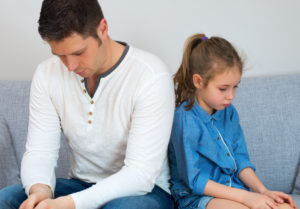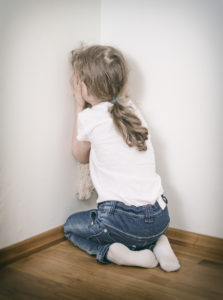Let’s face it, typical discipline for your spirited child is no fun at all, neither for the child or the parent. It’s scary for your child and you, as the parent, are overwhelmed by the end of it in guilt and frustration.
But what is the right way of disciplining your kids? There are about as many blogs and opinions about how to instill positive discipline as there are blogs on crockpot recipes. So, what do you do?
As a mom and a coach, I want to let you know that the best way is to keep it simple. Here are my five top approaches to starting it right.

1. Model Healthy Behavior
Do you know how little Suzie loves to get dressed up in her mommy’s clothes and heels? It turns out; little Suzie likes to copy everything her mommy does! It’s the classic case of small children mimicking adults or people that they love or find interesting. It’s funny when you watch your little one “monkey see, monkey do,” but there’s more merit to this small observation than you might expect.
And parents?
This includes our screen behaviors as well. Little eyes are watching! Children are like little sponges and what we say and what we do can have a significant impact on how we instill positive discipline for our kids.
In addition to modeling what you say and do when you are with them, your child will learn from how you interact with other adults and children as well. It is how they can learn to operate in this unfamiliar world. It's important to provide ample opportunities for your spirited child to see you interact in adult situations (yes, it will take planning because spirited kids don't typically have a lot of patience) so they learn how to behave themselves.
2. Provide Specific Guidance & Give Reasons Why
By changing up your language in how you give your child guidance, you can instill positive discipline. Instead of yelling at your spirited child, “don’t hit your brother,” you may find it much more effective to guide his hands elsewhere with “hands are for helping, come help me with…”
In this specific case, you may want to pull your child aside and have a short and sweet chat about why we don’t hit. By redirecting the misbehavior with affirmative action, you can instill positive discipline without saying “No,” or “Don’t,” all the time.
Your kids will learn to replace their poor behaviors with better choices if you are consistent with this strategy.
3. Prevention Can Be Better Than Discipline
Prevention is a lot more work upfront because it requires planning and creativity. However, it is a positive discipline for spirited children that will save your sanity in the long run.
Proactive planning such as knowing when your child gets hungry or tired during certain times of the day can prevent tantrums and other mishaps. You can save yourself the embarrassment of dragging your kid through the grocery aisle if you have a snack or a job for them as soon as you begin your shopping.
Instead of being in reactive mode, positive discipline requires you, as the parent, to have foresight. You know your child the best; to encourage cooperation, plan with their personal preferences, and schedule in mind. You can avoid arguments and negotiations with your child by merely planning out what could happen before it happens.
4. Focus on Praises with Substance
Your spirited child can determine feigned praise from a genuine compliment with substance. You would be surprised at how many times a child completely ignores an insincere “good job.”
We now know from research that a simple dialogue of “Tell me about what you just painted” rather than “Your picture is so pretty!” is beneficial and more meaningful to the child. Further, when we acknowledge that the child worked hard on something (when they did, in fact, work hard on it), they perform better in other tasks, and their self-confidence increases.
Instilling positive discipline for preschoolers with sincere praises will give your child a positive acknowledgment to look forward to the next time he faces a task or challenge. 
5. Time-Ins with Communication
You may, or may not have heard of it, but the new sheriff in town likes to give her kids time-ins instead of time-outs. Essentially, you are instilling positive discipline for your spirited child by removing them from a particular activity or situation and effectively communicating with them afterward with what is acceptable behavior.
As an alternative to time-outs, which can be effective for big misbehaviors, you can nip misbehavior in the bud through distraction. Before they get so upset they cry, or if you see they are starting to act out and they are getting close to misbehaving, you allow them to calm down with a book or a quick break.
Once they are happy (regulated) again, you can sit down with them to have a very short chat about why they were set aside for a time-in and how they can problem-solve for better ways to handle situations next time.